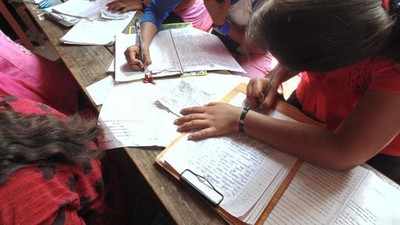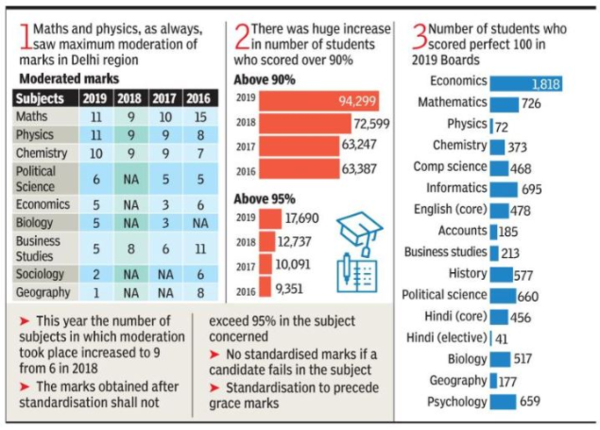- News
- Education News
- News
- CBSE gave 56 ‘extra’ marks in Class XII boards
Trending
This story is from June 27, 2019
CBSE gave 56 ‘extra’ marks in Class XII boards
Details accessed by TOI for nine subjects of this year’s Board exam in Delhi region reveal that CBSE granted up to 11 marks each in physics and mathematics, 10 in chemistry, six in political science and five each in economics, biology and business studies during the “moderation” process. Moderation is the process of granting extra marks to some students for different reasons.

Image used for representative purpose
Key Highlights
- Science students from the Delhi region who sat for CBSE’s Class XII exam this year and originally scored 84% or less in each of the main papers
- As reported exclusively by TOI, high moderation of marks in the Class XII board exams has become a trend from 2016 onwards
NEW DELHI: Science students from the Delhi region who sat for CBSE’s Class XII exam this year and originally scored 84% or less in each of the main papers, physics, mathematics and chemistry, were given a “boost” by the board of 32 marks — nearly 11% of the total marks in the three subjects.
Details accessed by TOI for nine subjects of this year’s Board exam reveal that the Central Board of Secondary Education granted up to 11 marks each in physics and mathematics, 10 in chemistry, six in political science and five each in economics, biology and business studies during the “moderation” process.
Sociology and geography marks were also moderated by two and one, respectively, taking the toal to 56 for all subjects. For four of the nine subjects, the moderated or standardised (as CBSE terms it) marks are a three-year high, while for physics, chemistry and political science the moderated marks are the highest in four years.
Details of the moderation exercise in other CBSE regions (apart from Delhi) could not be accessed.
Moderation is the process of granting extra marks to some students for a variety of reasons. “It is a tool for boards to address issues such as ambiguity in questions, unusually high difficulty level of a paper, equalising different sets of question papers in case of multiple sets, unusually lengthy question paper, tricky questions and questions found to be out of syllabus. The decision to grant marks to candidates is taken by the result committee,” said a senior CBSE official, on condition of anonymity, while confirming that there has been moderation to “standardise” the results this year as well.

The moderated marks aren’t given to all candidates equally. “Students who fail the subject will not be granted moderated marks. For others, the total marks in a subject after moderation must not exceed 95. For example, if 10 marks are being granted for a particular subject during moderation and a candidate has scored 89, he/she will be accorded six marks. However, candidates whose original marks are 85 of less will be given all 10 marks,” an official explained.
Many argue that high moderation is unfair to students who have performed well in examinations because the process enables not-so-good performers to catch up with “free” marks.
In the last four years, the number of subjects where CBSE applied moderation came down from 10 and 15 in 2017 and 2016, respectively, to six in 2018. This year, it has increased to nine subjects.
The practice of moderation till 2015 was restricted to grant of four or five marks at most. Some experts believe that high moderation could also be a reason for the unprecedented rise in number of high scorers.
Apart from the significant jump in the number of candidates scoring 90% and above in aggregate — from 63,387 in 2016 to 94,299 in 2019 — there has been a rise of nearly 90% in the number of students scoring 95% and more in this period.
A former controller of examination said moderation has been significantly higher in recent years. “High moderation was a rarity, with nine marks granted in mathematics in 2014 because there was a wrong question. But generally, from 2005 to 2015, moderation was restricted to four or five marks,” the former official said.
Agreeing that most boards are now resorting to competitive moderation as well, a school principal associated with CBSE’s evaluation process for over 12 years said, “Doing away with moderation is also not entirely desirable.”
“Moderation is a scientific exercise in which one sees the distribution of marks across regions over time and then analyses the data with respect to changes such as those in syllabus, question paper and ambiguity,” she said
Following unprecedented moderation of marks in 2016, a meeting was held on April 24, 2017 in which CBSE and 32 state boards had developed a consensus on scrapping the moderation policy. However, the Delhi high court asked CBSE to not scrap the policy, saying it was not advisable to implement the change mid-way.
The Centre set up a panel, Inter Board Working Group (IWBG), to ensure uniform marking for all students taking the Class XII board exam in 2018.
On August 6, 2018, the government said in Lok Sabha that the IWBG “recommends discontinuing of awarding moderation marks by all school education boards.” It said was unanimously decided that “all state boards decided to stop awarding moderation of marks for upward revision/spiking of marks from the current year except Kerala board…”
The government had added that the “practice of awarding moderation marks should be done away with, except in the cases of ambiguity in the question paper, inter-set variation in difficulty level (if multiple sets system exists in the board) and vagaries in the evaluation process based on statistical analysis. Bunching of marks and their spiking should be completely avoided.”
Details accessed by TOI for nine subjects of this year’s Board exam reveal that the Central Board of Secondary Education granted up to 11 marks each in physics and mathematics, 10 in chemistry, six in political science and five each in economics, biology and business studies during the “moderation” process.
Sociology and geography marks were also moderated by two and one, respectively, taking the toal to 56 for all subjects. For four of the nine subjects, the moderated or standardised (as CBSE terms it) marks are a three-year high, while for physics, chemistry and political science the moderated marks are the highest in four years.
Details of the moderation exercise in other CBSE regions (apart from Delhi) could not be accessed.
As reported exclusively by TOI, high moderation of marks in the Class XII board exams has become a trend from 2016 onwards . For certain subject, marks were raised by as much as 15 in 2016 and 2018.
Moderation is the process of granting extra marks to some students for a variety of reasons. “It is a tool for boards to address issues such as ambiguity in questions, unusually high difficulty level of a paper, equalising different sets of question papers in case of multiple sets, unusually lengthy question paper, tricky questions and questions found to be out of syllabus. The decision to grant marks to candidates is taken by the result committee,” said a senior CBSE official, on condition of anonymity, while confirming that there has been moderation to “standardise” the results this year as well.

The moderated marks aren’t given to all candidates equally. “Students who fail the subject will not be granted moderated marks. For others, the total marks in a subject after moderation must not exceed 95. For example, if 10 marks are being granted for a particular subject during moderation and a candidate has scored 89, he/she will be accorded six marks. However, candidates whose original marks are 85 of less will be given all 10 marks,” an official explained.
Many argue that high moderation is unfair to students who have performed well in examinations because the process enables not-so-good performers to catch up with “free” marks.
In the last four years, the number of subjects where CBSE applied moderation came down from 10 and 15 in 2017 and 2016, respectively, to six in 2018. This year, it has increased to nine subjects.
The practice of moderation till 2015 was restricted to grant of four or five marks at most. Some experts believe that high moderation could also be a reason for the unprecedented rise in number of high scorers.
Apart from the significant jump in the number of candidates scoring 90% and above in aggregate — from 63,387 in 2016 to 94,299 in 2019 — there has been a rise of nearly 90% in the number of students scoring 95% and more in this period.
A former controller of examination said moderation has been significantly higher in recent years. “High moderation was a rarity, with nine marks granted in mathematics in 2014 because there was a wrong question. But generally, from 2005 to 2015, moderation was restricted to four or five marks,” the former official said.
Agreeing that most boards are now resorting to competitive moderation as well, a school principal associated with CBSE’s evaluation process for over 12 years said, “Doing away with moderation is also not entirely desirable.”
“Moderation is a scientific exercise in which one sees the distribution of marks across regions over time and then analyses the data with respect to changes such as those in syllabus, question paper and ambiguity,” she said
Following unprecedented moderation of marks in 2016, a meeting was held on April 24, 2017 in which CBSE and 32 state boards had developed a consensus on scrapping the moderation policy. However, the Delhi high court asked CBSE to not scrap the policy, saying it was not advisable to implement the change mid-way.
The Centre set up a panel, Inter Board Working Group (IWBG), to ensure uniform marking for all students taking the Class XII board exam in 2018.
On August 6, 2018, the government said in Lok Sabha that the IWBG “recommends discontinuing of awarding moderation marks by all school education boards.” It said was unanimously decided that “all state boards decided to stop awarding moderation of marks for upward revision/spiking of marks from the current year except Kerala board…”
The government had added that the “practice of awarding moderation marks should be done away with, except in the cases of ambiguity in the question paper, inter-set variation in difficulty level (if multiple sets system exists in the board) and vagaries in the evaluation process based on statistical analysis. Bunching of marks and their spiking should be completely avoided.”
End of Article
FOLLOW US ON SOCIAL MEDIA










